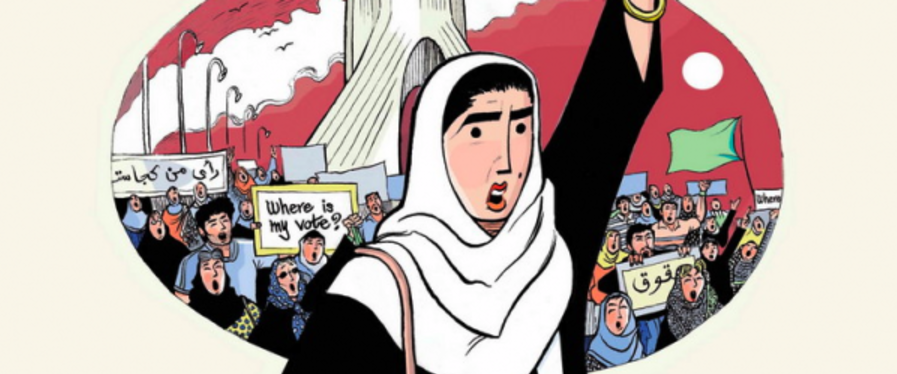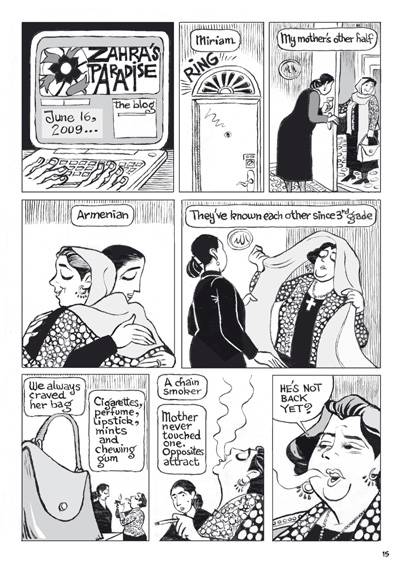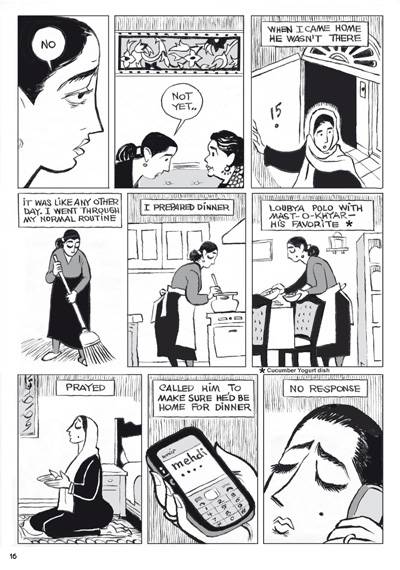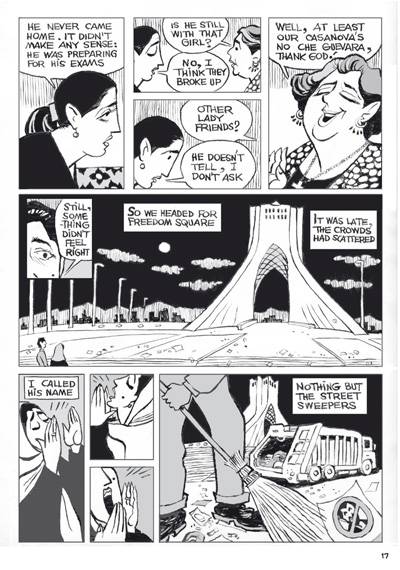A cemetery in southern Tehran stands in for multiple concepts in the disruptive, exquisite Zahra’s Paradise: a place for community, an equalizer, a safe space, a place emblematic of great injustice which also becomes a setting for justice. The story itself may be a fiction, but what an informed and heartbreaking one, drawn from a mustered history of disappeared Iranians over the past decades. What starts off with a mother searching through obstinate bureaucracy to find her son—all the while unsure if he is actually dead—becomes a kind of journey into the heart of Iran’s darkness, episodic in its format yet sweeping in its emotional momentum.
Originally began as weekly blog posts in 2010 which were then translated into multiple languages, Zahra’s Paradise is a comic by Amir & Khalil, a writer and artist, respectively, who avoided using their surnames for political reasons; interestingly, Amir has since been public about his own, though their names still adorn the book as mononyms. Those unfamiliar with the retaliatory nature of Iranian cultural authorities may question their evasiveness for a story they claim as fictional, but the comic is very decidedly and successfully a fiction which incorporates truth in multiple guises: metaphorical, allegorical, referential, and most of all, emotional. Amir expands on this in the back of the book: “If we succeed, it is because fiction can open a window into reality when reality is too painful, distant, silent, or hard to reach…It is certain that words and images have the power to expose truths that can break through some very thick walls.”
Mehdi went to a protest and hasn’t been seen since. The 2009 presidential election in Iran is the backdrop, and Zahra’s Paradise takes place in this dissatisfied immediacy, quickly introducing you to Mehdi’s mother Zahra and his brother Hassan, a blogger who documents their search and serves as narrator. As the story evolves, they encounter and involve themselves with a number of expressive, complicated characters, all of whom exist at various points in the spectrum of Iranian power. Many seek to dislodge this power, some want to understand it, some enforce the horrors of the prison complex. Others, like the titular character and her son, want nothing more than peace and safety for their family, and will go to immense lengths to secure it.

To say that this is one of the most beautiful graphic novels I’ve read in the past decade is deceptive, because it is also one of the most crushing, grief-stricken, infuriating experiences as well. By leveraging the ironic or allegorical with the unflinchingly explicit, mixing the historical with a highly imaginative style and creativity, the narrative virtually engulfs the reader. Zahra herself is an iconic, courageous presence, a mother who is all mothers, compelling strangers to assist her quest for truth against all odds, and without being asked. There is a notion in the story of uplifting the heroes both known and unknown, the martyrs who lie dead at a protest, the rebels hidden in basements printing fliers and leaflets, and the ceaseless questions of the mothers against gargantuan authorities.
From the mysterious prologue which takes place in the hamlet of Evin to the final, wrenching scenes, Zahra’s Paradise explores the full potential of the comics medium. Even the afterword is worthy of particular praise, inclusive of a glossary, an eloquent author’s note, and many other pieces of content, including descriptive context for the characters, some of whom reference specific Iranians of note. Additionally, it appears that the creators are working on a followup, and though limited information is available, they did share a tweet with an update on it back in 2015.
Zahra’s Paradise may be lauded for its representation of a culture, which is artfully realized, but it’s also a meditation on modern connectivity, in the streets and online. Social media and online interaction is an important theme, and social media was also what led to the blog’s success prior to its print form; furthermore, an online campaign in 2013 positioned the main character as a virtual candidate.
Immediate comparisons to graphic novels Maus and Persepolis are inescapable, but I would argue that these classics approach a more conventional memoir format. Zahra’s Paradise, on the other hand, is much broader, somehow presenting a united narration for a people in the singular story of a mother. This decision makes the proceedings feel elemental and even meaningfully hopeful. It’s a human rights epic in comic form, yet also a beautifully illustrated entertainment.
Make sure to support these creators, and also take a look at Amir’s Emmy-nominated (unrelated) documentary from last year, Dogtown Redemption.
Sample pages via Macmillan Publishers:












